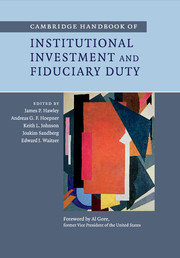Book contents
- Frontmatter
- Contents
- List of figures
- List of tables
- List of contributors
- Foreword
- 1 Introduction
- Part I Fiduciary duty: a global outlook
- Part II Fiduciary duty and the landscape of institutional investment
- Part III Challenging conventional wisdom on fiduciary duty
- Part IV Towards a broader interpretation of fiduciary duty
- Part V Beneficiaries’ roles and viewpoints
- Part VI Fiduciary duty and governance
- 30 Investors and global governance frameworks: broadening the multi-stakeholder paradigm
- 31 Promoting corporate sustainability through integrated reporting: the role of investment fiduciaries and the responsibilities of the corporate board
- 32 Reporting and standards: tools for stewardship
- 33 US corporate governance, fiduciary success and stable economic growth
- 34 Fulfilling fiduciary duties in an imperfect world – governance recommendations from the Stanford Institutional Investor Forum
- 35 Addressing the participation gap in institutional investment: an assessment framework and preliminary results
- 36 The costs of fiduciary failure – and an agenda for remedy
- Index
- References
30 - Investors and global governance frameworks: broadening the multi-stakeholder paradigm
Published online by Cambridge University Press: 05 April 2014
- Frontmatter
- Contents
- List of figures
- List of tables
- List of contributors
- Foreword
- 1 Introduction
- Part I Fiduciary duty: a global outlook
- Part II Fiduciary duty and the landscape of institutional investment
- Part III Challenging conventional wisdom on fiduciary duty
- Part IV Towards a broader interpretation of fiduciary duty
- Part V Beneficiaries’ roles and viewpoints
- Part VI Fiduciary duty and governance
- 30 Investors and global governance frameworks: broadening the multi-stakeholder paradigm
- 31 Promoting corporate sustainability through integrated reporting: the role of investment fiduciaries and the responsibilities of the corporate board
- 32 Reporting and standards: tools for stewardship
- 33 US corporate governance, fiduciary success and stable economic growth
- 34 Fulfilling fiduciary duties in an imperfect world – governance recommendations from the Stanford Institutional Investor Forum
- 35 Addressing the participation gap in institutional investment: an assessment framework and preliminary results
- 36 The costs of fiduciary failure – and an agenda for remedy
- Index
- References
Summary
Introduction
Companies play an increasingly important role in the global economy. With this growth has emerged a strong view that companies share in responsibilities traditionally assigned to governments – such as those relating to human rights and the environment (Ambachtsheer 2011). A wide range of norms, codes of conduct and conventions have emerged to translate this broadening acceptance of extended corporate responsibility into policy and practice (see Appendix 30.1).
Traditionally, conventions were developed by multilateral institutions and targeted for ratification by national governments. More recently, a broader range of stakeholders have become involved in developing and supporting conventions under the espoused benei ts of “multi-stakeholder processes” (Vallejo and Hauselmann 2004). This has resulted in a shift from legislative foundations towards the emergence of “soft law” approaches to regulating behavior, tending to take the form of nonbinding and voluntary codes of conduct. Multi-stakeholder processes have gained their standing as valid mechanisms to develop and implement codes of conduct in part because they include input from a broad range of stakeholders in their design, implementation and oversight. This chapter focuses on one stakeholder which is largely absent from the analysis of these processes – investors.
- Type
- Chapter
- Information
- Publisher: Cambridge University PressPrint publication year: 2014



